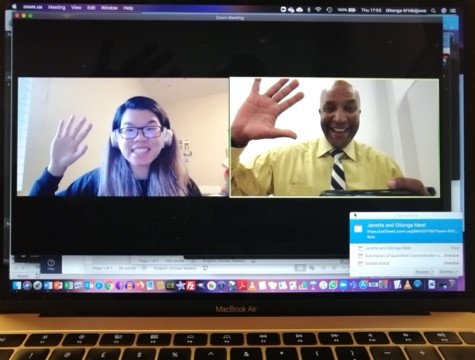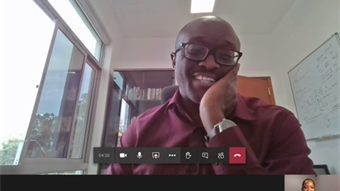AKU’s Virtual Internship Programme (AKU-VIP) represents a new model of interning for students. Interns have been placed in research, communications, strategy, and resource development projects across areas including the Health Sciences, Media & Communications, Education, Hospital Administration, Climate Change, Partnerships, and Fundraising.
As our interns adapt to this new model, so are our mentors! Providing one-on-one consultation whenever needed, mentors working across 45 projects, continue to help our students shape and guide their professional interests, understand and tackle real-life issues and build their skills set as they get ready for this new world.
Razia Velji, the current Senior Advisor to the Office of the Chief Development Officer, is also a mentor in the Resource and Development project department. She shares ‘It has been great to have an extra resource to inform our work (through mentorship) particularly at a time of resource constraints. It is also wonderful to work with a new generation of students who are so enthusiastic and so hard-working, but also extremely skilled and savvy. I am looking forward to continued engagement with the interns and also watching them grow and develop their skills and passions.’
She highlights the work of AKU-VIP interns Noah Pirani (Brown University) and Lina Maria Zuluaga (Simon Fraser University) who have both proven to be extremely dedicated, hard-working, and passionate in their roles thus far.
 Mentor Gitonga Mbijjewe, also the Director of Strategic Initiatives at the Aga Khan University's Graduate School of Media & Communications (AKU-GSMC), agrees it has been quite a stretch to maintain regular work schedules, focus, and sufficient human interaction with this virtual alternative. But mentors like Mbijjewe himself are actively trying to think of ways to make virtual guidance as meaningful as possible for interns.
Mentor Gitonga Mbijjewe, also the Director of Strategic Initiatives at the Aga Khan University's Graduate School of Media & Communications (AKU-GSMC), agrees it has been quite a stretch to maintain regular work schedules, focus, and sufficient human interaction with this virtual alternative. But mentors like Mbijjewe himself are actively trying to think of ways to make virtual guidance as meaningful as possible for interns.
Mentors try to have weekly follow-ups, regular staff meetings, and virtual coffee chats to create a truly immersive environment for interns to feel comfortable and productive during their time with AKU and AKDN.
Mbijjewe says ‘Our intern Janette Lee, a student of Simon Fraser University has been an invaluable asset to our operations, primarily enhancing School’s (GSMC) communication channels. Her adaptability to the situation is highly commended especially considering the brutal shift in our work cycles. However, her skill set, maturity, and knowledge of technology have made for a pleasant experience.’
 Dr. Evans Kituyi, Director of the Aga Khan University’s East African Institute (AKU-EAI), and also another one of our programme mentors, has been overseeing projects about interventions against household air pollution from fuel use. Dr. Kituyi agrees that the VIP model has been interesting to adapt to, and significant progress has been made by his interns. His two student interns, Cecilia Mweka from Colorado College and Obianuju Nwadike from the University of Toronto, with Kituyi’s guidance, have been able to make an impact on imparting knowledge and skills around (a.) household energy and health challenges in LMICs; (b.) on the methodology for databases searches and data analysis; and, (c.) on webinar organization and presentation.
Dr. Evans Kituyi, Director of the Aga Khan University’s East African Institute (AKU-EAI), and also another one of our programme mentors, has been overseeing projects about interventions against household air pollution from fuel use. Dr. Kituyi agrees that the VIP model has been interesting to adapt to, and significant progress has been made by his interns. His two student interns, Cecilia Mweka from Colorado College and Obianuju Nwadike from the University of Toronto, with Kituyi’s guidance, have been able to make an impact on imparting knowledge and skills around (a.) household energy and health challenges in LMICs; (b.) on the methodology for databases searches and data analysis; and, (c.) on webinar organization and presentation.
In providing quality experiences and exposure through vast resources and networks, all of our programme mentors continue to pave new and creative paths for their interns. The unique virtual model establishes by AKU-VIP is allowing both mentors and interns to be innovative and productive while capitalizing on the digital environment the world is turning to.

